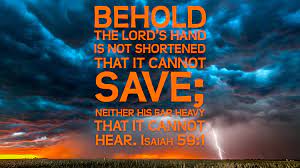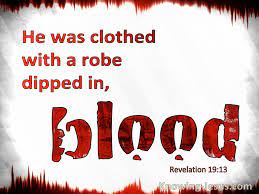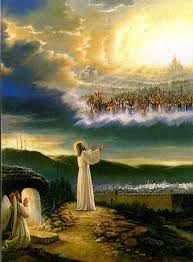ISAIAH 59 1 Behold, the Lord’s hand is not shortened,
|

ISAIAH 59 1 Behold, the Lord’s hand is not shortened,
|

This last section of the book of Isaiah covers the final events of world history, and closely parallels the book of Revelation. As I pointed out when we began this study thirteen weeks ago, the book of Isaiah is in many ways a miniature Bible. It divides like the Bible. The Bible has 66 books, and Isaiah has 66 chapters. The Old Testament has 39 books, and the first division of Isaiah has 39 chapters. The New Testament has 27 books, and the second half of Isaiah has 27 chapters. The theme of the last of Isaiah is the theme of the last of the Bible: the end!
Matthew quotes the words of Jesus, "This gospel of the kingdom shall be preached to all the earth as a witness to every nation, and then the end shall come," (Matthew 24:14). It is that end that Isaiah brings before us now in these closing chapters of his prophecy, beginning at Chapter 59. This chapter answers the question many are asking today, "Why is the world in such a mess? If God is really running this world, why is he doing such a poor job of it?" Some feel even they could do a better job.
God's answer to these questions is given in the opening words of chapter 59:
Behold, the Lord's hand is not shortened, that it cannot save,
or his ear dull, that it cannot hear ["It is not my failure," God says];
but your iniquities have made a separation
between you and your God,
and your sins have hid his face from you
so that he does not hear.
For your hands are defiled with blood
and your fingers with iniquity;
your lips have spoken lies,
your tongue mutters wickedness. (Isaiah 59:1-3 RSV)

The problem is not with God, but with man. The passage goes on to describe the wickedness of Israel particularly (since this chapter is addressed to the nation), and beyond that, to the whole world. The Apostle Paul quotes Verses 7-8 in Romans 3 to show that this applies to the whole race of men.
Their feet run to evil,
and they make haste to shed innocent blood;
their thoughts are thoughts of iniquity,
desolation and destruction are in their highways. [He has been reading the statistics of carnage on our highways.]
The way of peace they know not,
and there is no justice in their paths. (Isaiah 59:7-8a RSV)
That is an excellent description of what theologians call "the depravity of man." God says there is something wrong with us. It is utter foolishness to deny it.
At the close of World War II, Sir Winston Churchill, a great historian in his own right, penned these words,
Certain it is that while men are gathering knowledge and power with ever-increasing speed, their virtues and their wisdom have not shown any notable improvement as the centuries have rolled. Under sufficient stress: starvation, terror, warlike passion, or even cold intellectual frenzy, the modern man we know so well will do the most terrible deeds, and his modern woman will back him up.
That eloquently confirms what Isaiah declares. The problem is not so much the presence of human sin, for God has an answer for that, set forth in Chapter 53 of Isaiah, in the marvelous story of One who was "wounded for our transgressions, bruised for our iniquities; upon him was the chastisement that made us whole, and with his stripes we are healed," (Isaiah 53:5). Yes, God has a full answer to the dilemma of human evil, but the problem that separates man from God is an unwillingness to admit to that evil. That is what keeps God from acting on our behalf. If you come with a humble, repentant heart, you can get anything from God; but if you come with a self-justifying excuse, God will give you nothing.
 Man is strangely reluctant to admit that he is contributing to the problems he faces. People seem to be blind to the fact that selfish ways and self-centered actions and attitudes are directly connected with the terrible evils that flood our land and fill our newspapers today. It is very difficult to get them to accept the fact that God's wrath comes upon mankind because of our wrong attitudes and actions. This is why so much evil abounds -- drug abuse, child abuse, wife beating, incest, homosexuality, pornography, and other terrible things. Strangely, we seem to be incapable of doing anything about these. They only worsen from generation to generation.
Man is strangely reluctant to admit that he is contributing to the problems he faces. People seem to be blind to the fact that selfish ways and self-centered actions and attitudes are directly connected with the terrible evils that flood our land and fill our newspapers today. It is very difficult to get them to accept the fact that God's wrath comes upon mankind because of our wrong attitudes and actions. This is why so much evil abounds -- drug abuse, child abuse, wife beating, incest, homosexuality, pornography, and other terrible things. Strangely, we seem to be incapable of doing anything about these. They only worsen from generation to generation.
As Churchill has pointed out, there is no improvement as the centuries have rolled by. The reason is that we are unwilling to admit our evil and this is oftentimes true of Christians as well as the world.
At Verse 9 of this chapter, however, there is a dramatic change. A group comes forth who do admit their part in the problem. They are the remnant of Israel, the tiny believing band of Jews who do acknowledge that they have gone wrong.
Therefore justice is far from us,
and righteousness does not overtake us;
we look for light, and behold, darkness,
and for brightness, but we walk in gloom.
We grope for the wall like the blind,
we grope like those who have no eyes;
we stumble at noon as in the twilight
among those in full vigor, we are like dead men. (Isaiah 59:9-10 RSV)
What a strange blindness permeates all of human society today! The confession continues.
We all growl like bears [Does that sound like your house?];
we moan and moan like doves;
we look for justice, but there is none;
for salvation but it is far from us.
For our transgressions are multiplied before thee,
and our sins testify against us;
for our transgressions are with us,
and we know our iniquities:
transgressing, and denying the Lord,
and turning away from following our God,
speaking oppression and revolt,
conceiving and uttering from the heart lying words. (Isaiah 59:11-13 RSV)
That is the real problem. But what an honest confession is here, a full acknowledgment that the problem is with you and me -- not God! There is an immediate divine response to that confession:
The Lord saw it, and it displeased him
that there was no justice.
He saw that there was no man,
and wondered that there was no one intervene;
then his own arm brought him victory,
and his righteousness upheld him.
He put on righteousness as a breastplate,
and a helmet of salvation upon his head;
he put on garments of vengeance for clothing,
and wrapped himself in fury as a mantle. (Isaiah 59:15b-17

This is looking on to the day, described in the book of Revelation and other places, when God will begin to judge evil in human hearts. God acts immediately to this end. And he will come to Zion as Redeemer, to those in Jacob who turn from transgression, says the Lord.
This is the second return of Jesus, when he comes to Israel to deliver them from their evil. As Israel's Redeemer, he comes to Zion (Jerusalem) to begin his restorative work. Chapter 60 is another glowing description of the blessing of Israel after its restoration. This is a beautiful account of what prophecy students call the "millennium," the thousand years of blessing that follows the restoration of Israel to its God. It begins with a summons to the nation to stand up and rejoice in its deliverance.
Arise, shine; for your light has come,I hope you will read for yourself this beautiful poetic description of millennial blessings, when Israel will be the head of the nations. The chapter closes with language very reminiscent of the book of Revelation.
and the glory of the Lord has risen upon you.
For behold, darkness shall cover the earth,
and thick darkness the peoples;
but the Lord will arise upon you,
and his glory will be seen upon you.
And nations shall come to your light,
and kings to the brightness of your rising. (Isaiah 60:1-3 RSV)
Your sun shall no more go down,
nor your moon withdraw itself;
for the Lord will be your everlasting light,
and your days of mourning shall be ended.
Your people shall all be righteous;
they shall possess the land for ever,
the shoot of my planting, the work of my hands,
that I might be glorified.
The least one shall become a clan,
and the smallest one a mighty nation;
I am the Lord;
and in its time I will hasten it. (Isaiah 60:20-22 RSV)
All of God's promises to Israel will be fulfilled to the letter. These great passages in Isaiah look forward to that time of earthly glory, when Israel shall be the foremost of the nations. It shall all come to pass, exactly as recorded here. Chapter 61 is a flashback to the days of the Messiah's first appearance. It opens with his own words.
The Spirit of the Lord God is upon me,
because the Lord has anointed me
to bring good tidings to the afflicted;
he has sent me to bind up the brokenhearted,
to proclaim liberty to the captives,
and the opening of the prison to those who are bound;
to proclaim the year of the Lord's favor,
and the day of vengeance of our God;
to comfort all who mourn;
to grant to those who mourn in Zion --
to give them a garland instead of ashes,
the oil of gladness instead of mourning,
the mantle of praise instead of a faint spirit;
that they may be called oaks of righteousness,
the planting of the Lord, that he may be glorified. (Isaiah 61:1-3 RSV)
Luke's gospel records that Jesus went into the synagogue at Nazareth on one occasion, as was his custom, and asked for the scroll of the prophet Isaiah. He unrolled it until he found the place where these words are written. Turning to this very spot, he read this passage about the Spirit coming upon him, anointing him, and that he was called to preach the gospel, to bind up the brokenhearted, to proclaim liberty to captives, etc. He stopped reading in the middle of a sentence, after the comma following the words, "to proclaim the year of the Lord's favor." Then he closed the scroll, handed it back to the attendant, sat down, and said, "This day is this Scripture fulfilled in your hearing."
Note carefully where he stopped reading. He did not go on to read, "and the day of vengeance of our God," because when he first came he introduced "the day of God's favor," the day when God withholds his judgment.
This is the answer to the question people are asking, "Why doesn't God do something?" The answer is, because he is giving people everywhere a chance! When he starts judging, he will judge the whole world -- everybody in it, without exception. Only those who have already bowed to his will — will escape the penalty of that judgment. Then he will begin "the day of vengeance of our God," the phrase Jesus did not read that day in the synagogue. This comma has been called "the longest comma in history." "The year of the Lord's favor" now covers almost two thousand years of time, but it will be followed by "the day of vengeance of our God."
Notice the contrast between "the year of his grace," and "the day of vengeance." God does not like vengeance. He does not delight in judgment. Isaiah calls it "his strange work." But it must be done eventually, though it will be kept as brief as possible. This is what prophecy records as "the time of the end."
The rest of the chapter and all of Chapter 62 go on again to describe the restoration of Israel. All of this applies to us spiritually, as a description of our permanent relationship with God and describing the security of the believer. Hear Verses 3-4 of Chapter 62:
You shall be a crown of beauty in the hand of the Lord,
and a royal diadem in the hand of your God.
You shall no more be termed Forsaken,
and your land shall no more be termed Desolate;
but you shall be called My delight is in her
and your land Married;
for the Lord delights in you,
and your land shall be married. (Isaiah 62:3-4 RSV)
Those are specific promises to Israel that have spiritual application to us. The last verse of Chapter 62 speaks to this as well:
They shall be called The holy people,
The redeemed of the Lord;
and you shall be called Sought out,
a city not forsaken. (Isaiah 62:12 RSV)
This is to be the ultimate fate of Jerusalem, but describes our status in the eyes of our Lord. We are "accepted in the Beloved," (Ephesians 1:6 KJV).
 Chapter 63 is another picture of the judgment of God. It portrays the Messiah coming to Jerusalem from the south and entering into a dialogue with the believers there.
Chapter 63 is another picture of the judgment of God. It portrays the Messiah coming to Jerusalem from the south and entering into a dialogue with the believers there.
He comes from Edom, in the Negeb, with blood-soaked garments. Those who see him coming ask,
Who is this that comes from Edom,
in crimsoned garments from Bozrah,
he that is glorious in his apparel,
marching in the greatness of his strength? (Isaiah 63:1a RSV)
Jesus answers, "It is I, announcing vindication,
mighty to save" (Isaiah 63:1b RSV)
They respond,
Why is thy apparel red,
and thy garments like his that treads in the wine press? (Isaiah 63:2 RSV)
His answer comes,
"I have trodden the wine press alone,
and from the peoples no one was with me;
I trod them in my anger
and trampled them in my wrath;
their lifeblood is sprinkled upon my garments,
and I have stained all my raiment.
For the day of vengeance was in my heart,
and my year of redemption has come." (Isaiah 63:3-4 RSV)
The parallel to this is found in Chapter 14 of the book of Revelation, where the apostle sees an angel coming out from heaven, having a great sickle in his hand,
Then another angel came out from the altar, the angel who has power over fire, and he called with a loud voice to him who has the sharp sickle, "Put in your sickle and gather the clusters of the vine of the earth, for its grapes are ripe." So the angel swung his sickle on the earth and gathered the vintage of the earth and threw it into the great wine press of the wrath of God, and the wine press was trodden outside the city and blood flowed from the wine press as high as a horse's bridle for one thousand six hundred stadia. (Revelation 14:18-20 RSV)
That measurement is about two hundred miles -- which is the distance from Lebanon in the north down to Edom in the south of Israel. The whole land will be covered with blood from the great battle of Armageddon, the warfare that ends the struggles of earth, as depicted in other Scriptures. This is a terrible picture of the treading of the wine press. The "harvest" always deals with Gentiles, while the "wine press" is always a picture of God's judgment of Israel. This will be "the time of Jacob's trouble" which Jeremiah mentions.
Chapter 64 is the response of the remnant of Israel, the believing Jews, to this. Their cry is a prayer,
O that thou wouldst rend the heavens and come down,
that the mountains might quake at thy presence --
as when fire kindles brushwood
and the fire causes water to boil --
to make thy name known to thy adversaries,
and that the nations might tremble at thy presence! (Isaiah 64:1-2 RSV)
They are asking God for judgment, crying, "We know this will be terrible, but it is the only way. So come, Lord, do your work." Hasn't this been our cry at times, when we have seen the terrible things that are going on around us: "Lord, come and end this terrible scene, at whatever cost"? This, then, is the prayer of the remnant, the earnest pleading for relief. The prayer rises out of an awareness of the majesty and the uniqueness of God, exemplified in their words in verse 4,
From of old no one has heard
or perceived by the ear,
no eye has seen a God besides thee,
who works for those who wait for him. (Isaiah 64:4 RSV)
Paul quotes those verses in First Corinthians (2:9-10), saying these unrevealed things have been revealed to us by the Spirit. If you want to see God, and know God, then search his Word. Study it, think it through. Let the majesty of God be taught to you by the Spirit of God, for that is what he has come to do.
God replies to all this in Chapters 65 and 66, which close the book of Isaiah. He first reminds Israel that he has always been available to them, if they were only ready to turn to him. He proves this by pointing out that he has been available even to the Gentiles; not only to the chosen people but also even to the Gentiles.
I was ready to be sought by those who did not ask for me;
I was ready to be found by those who did not seek me.
I said, "Here am I, here am I,"
to a nation that did not call on my name. (Isaiah 65:1 RSV)
He is speaking of the Gentiles. But what about Israel? Of them, he says,
I spread out my hands all the day
to a rebellious people,
who walk in a way that is not good,
following their own devices;
a people who provoke me
to my face continually, (Isaiah 65:2-3a RSV)
They are idolaters, following other gods. That is what is wrong with them. More than that,
...who say, "Keep to yourself,
do not come near me, for I am set apart from you." (Isaiah 65:5a RSV)
Literally, the words are, "I am holier than thou." This is where that phrase comes from. If there is any sin in the Bible that is categorized as being worse than any other sin, it is the sin of self-righteousness! That is the sin of Israel. It is also the sin of the church. Like the Pharisees, we often draw our garments around ourselves, crying, "We would never do that!" Remember that the hardest words of Jesus were uttered against the self-righteousness of the Pharisees. Not one of us knows what we would do, given certain circumstances, if we thought we could get away with it or everybody else was doing it. That is the terrible evil of the human heart.
 width="193" height="262" alt=""/>But after the time of God's judgment of Israel, God will fulfill all his promises. Once again we have described here the beautiful conditions of the millennium, beginning with the promise ultimately of a new heaven and a new earth:
width="193" height="262" alt=""/>But after the time of God's judgment of Israel, God will fulfill all his promises. Once again we have described here the beautiful conditions of the millennium, beginning with the promise ultimately of a new heaven and a new earth:
For behold, I create new heavens
and a new earth;
and the former things shall not be remembered
or come into mind.
But be glad and rejoice for ever
in that which I create;
for behold, I create Jerusalem a rejoicing,
and her people a joy.
I will rejoice in Jerusalem,
and be glad in my people;
no more shall be heard in it the sound of weeping
and the cry of distress.
No more shall there be in it
an infant that lives but a few days,
or an old man who does not fill out his days,
for the child shall die a hundred years old, (Isaiah 65:17-20a RSV)
That is, when a child is one hundred years old he is still a mere child. The longevity of the ancient world will come back again.
...and the sinner a hundred years old shall be accursed.
They shall build houses and inhabit them;
they shall plant vineyards and eat their fruit.
They shall not build and another inhabit;
they shall not plant and another eat;
for like the days of a tree shall the days of my people be, (Isaiah 65:20b-22a RSV)
What a beautiful picture of the restoration of the earth! Isaiah closes with words describing the change that shall occur in the animal kingdom, a description we have already seen in Chapter 11 of this prophecy.
The wolf and the lamb shall feed together,
the lion shall eat straw like the ox;
and dust shall be the serpent's food.
They shall not hurt or destroy
in all my holy mountain. (Isaiah 66:25 RSV)
The final chapter continues the dialogue between Jehovah and Israel. The fascinating thing about this chapter is that it is a direct reply to the yearning on the part of many in Israel today to rebuild the temple upon Mount Moriah. As you know, some of us have had a very close association with the Jews who are committed to rebuilding a temple upon that mount. They are determined to do this and they are working every way they can to accomplish it. But God has a word for them, which we find in the opening words of this chapter,
Thus says the Lord:
"Heaven is my throne
and the earth is my footstool;
what is the house which you would build for me,
and what is the place of my rest?
All these things my hand has made,
and so all these things are mine, says the Lord.
But this is the man to whom I will look,
he that is humble and contrite in spirit,
and trembles at my word." (Isaiah 66:1-2 RSV)
It is not that the temple will not be built. It will be. And animal sacrifices will once again be offered in it as they were offered in the days of our Lord. But God is saying that these are all worthless if he is not enshrined in the heart. He goes on to describe in scathing language what animal sacrifices will mean without that heart worship.
"He who slaughters an ox is like him who kills a man;
he who sacrifices a lamb, like him who breaks a dog's neck;
he who presents a cereal offering,
like him who offers swine's blood;
he who makes a memorial offering of frankincense,
like him who blesses an idol.
These have chosen their own ways,
and their soul delights in their abominations." (Isaiah 66:3 RSV)
We have seen all through this book how God hates phony religion. He hates outward ritual that has no inner reality! This will be true of those days as well. Let me point out one word he utters here to the true believers in Israel. Verse 5,
Hear the word of the Lord,
you who tremble at his word:
"Your brethren who hate you
and cast you out for my name's sake
have said, 'Let the Lord be glorified,
that we may see your joy'; [That is sarcastic language.]
but it is they who shall be put to shame." (Isaiah 66:5 RSV)
Then the most amazing wonder of all times is unveiled in Verses 7-9:
"Before she was in labor
she gave birth;
before her pain came upon her
she was delivered of a son.
Who has heard such a thing?
Who has seen such things?
Shall a land be born in one day?
Shall a nation be brought forth in one moment?
For as soon as Zion was in labor
she brought forth her sons.
Shall I bring to the birth and not cause to bring forth?
says the Lord;
shall I, who cause to bring forth,
shut the womb? says your God." (Isaiah 66:9 RSV)
What is this all about? The most amazing thing that has happened in human history is that Israel produced a son, Jesus, before she travailed in labor. The great tribulation and the judgment of Israel described here is as a woman in labor, and yet Israel will come to the realization that nineteen hundred years before she entered into her labor, she had already had a son! This is the great wonder of the age. God declares that people will say, "Who has ever heard such a thing, that a nation then 'shall be born in a day.'" When Jesus returns, and the nation sees who it is, those will believe in him will be made righteous and they shall flood the earth with the knowledge of God. Israel shall be God's witnesses in that day.
The closing verses are a final description of the restoration of that nation, and promise anew of the new heavens and the new earth still to come:
"For as the new heavens and the new earth
which I will make
shall remain before me, says the Lord;
so shall your descendants and your name remain.
>From new moon to new moon,
and from sabbath to sabbath,
all flesh shall come to worship before me,"
says the Lord. (Isaiah 66:22-23 RSV)
This is a millennial scene. Even during those times when all the nations, led by Israel, shall come up to Jerusalem to worship, God will have provided a memorial for them, reminding them of the cost of disobedience and the terrible fate of unbelief.
"They shall go forth and look on the dead bodies of the men that have rebelled against me; for their worm shall not die, their fire shall not be quenched, and they shall be an abhorrence to all flesh." (Isaiah 66:24 RSV)
So the great prophecy comes to an end. We are left with the question, "Do we truly know this loving, patient God, terrible in his justice, awful in his might and power, yet so earnestly loving in his attempt to bring men to himself?"
That is the great question. The name Isaiah means "Jehovah saves." That is what God wants. This great prophecy is a testimony to the fact that, "God is not willing that any should perish, but that all men should come to the knowledge of repentance," 2 Peter 3:9).
Let me close with these words from C.S. Lewis,
In God you come up against something which is in every respect immeasurably superior to yourself. Unless you know God as that, and, therefore, know yourself as nothing in comparison, you do not know God at all. As long as you are proud, you cannot know God. A proud man is always looking down on things and people; and, of course, as long as you are looking down, you cannot see something that is above you.
And then Comes the End, MARCH 02, 1986Thank you, Father, for this honest and searching book. How beautifully it describes the program of history, much of which still lies unfulfilled before us; yet how marvelously we see you there, and begin to understand the majesty and the mercy of your Being. Help us to adjust our lives accordingly, to come humbly and contritely before you to obtain the mercy we so desperately need. We ask it in Jesus' name. Amen.

Lambert's Main Library
Email in welcome: Lambert Dolphin
Archive for Newsletters
Library Annex (680+ messages: Help Thyself )
Keyword Search of Lambert's Web Site
